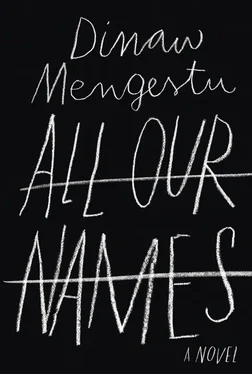The first students who came to Isaac were cousins. Their names were Patience and Hope, and they were dressed in matching pleated gray skirts that took the risk of being cut almost an inch above the knee.
“Sit,” he told them, and then he gestured with his hand toward me. “This is my friend Langston the Professor, the future Emperor of Ethiopia.” Before they had the time to question what they were doing, he said, “Now, tell me, what crimes against our country have you committed today?”
Neither was timid, and Isaac was perfectly at ease; I was the one who, in the company of women my own age, wanted to run.
Patience, whose mouth bristled with clean, hard white teeth, spoke first. “Does sitting here count as a crime?” she asked.
Isaac smiled. “Yes,” he said, “it definitely does.”
He turned to Hope, who was leaning against her cousin. “And you,” he said. “If you’re related, then that makes you guilty as well.”
They laughed. They had come to be amused, and Isaac had charmed them. He didn’t try for more than that. After they had played their role, he asked where they were from and what they were studying. Both were majoring in economics; they were born and raised in the capital.
“Economics,” Isaac said, “that’s very good,” but I knew that, like me, he had only a vague understanding of what that meant: money, who had it and who didn’t. As Patience and Hope walked away, Isaac told them not to forget to say goodbye to the future emperor. Only Patience acknowledged me: “Goodbye, Emperor,” she said. By the time I thought to respond, she was too far away to hear me. Isaac watched me follow her with my eyes.
“Don’t worry,” he said. “She’ll be back.”
Patience and Hope were just the beginning. More students came and introduced themselves to Isaac so he could ask them what crimes they had committed that day. One boy confessed to stealing money from his father, to which Isaac responded: “Stealing is not a crime in this country. Not stealing, however, is a terrible thing.” All the boys and girls close enough to hear that made sure everyone saw them laugh. When they were gone, Isaac whispered to me: “Did you see who laughed the hardest?” I hadn’t, and I doubt he had, either, but I knew the answer.
“The boys with the polished shoes,” I said.
“That’s right. It was Alex.”
If students didn’t know what to say, he adjusted the rules of his game. He helped them invent their crimes. He borrowed from the president’s daily radio broadcasts, which for months had been long, rambling diatribes against all the enemies of the country, from the Europeans and Americans to the Africans who were secretly working with them.
“Have you ever been an imperialist?” he asked them. “Have you ever tried to colonize a country?” “Do you listen to British Radio?” “Do you know who the Queen of England is?” “Have you ever been friends with a European?” “Have you ever wanted to go to America?”
Over the course of a few weeks, Isaac’s confessions drew hundreds of students, and of those, a few dozen returned consistently. On most days, those of us gathered under the tree did so simply to be in the company of others. There was comfort, even a certain amount of joy, in finding one another in the grass and in seeing others join us. We were two, then five and ten, sometimes as many as twenty. Most of us didn’t know one another’s names or ages or reasons for being there, and that was fine, because silence isn’t the same when it’s shared. Its sad and lonely sides are shunted off. We were content just to be there, and had nothing else ever come out of it, I’m certain I would have regarded those moments as some of the most memorable of my life.
The protests that had begun at the start of the semester turned violent at the same time Isaac’s confessions were making him a celebrity on campus. When we returned home one evening, we heard how, in another shanty village that neither of us had ever been to, tires had been cast around the necks of four soldiers who had come to arrest someone. After a few minutes of watching the soldiers struggle to free themselves, someone doused the tires with gasoline and set them ablaze. The smell and their cries were said to have been so strong that no one stayed to watch them die; they were left to smolder for almost an hour, with the extra shame of having no one there to witness their torture. The next day, the neighborhood was cordoned off, and for twenty-four hours no one who lived there was allowed to leave. A few days later, several people were shot while walking too close to the palace gates as part of a supposed plot to kill the president. The proof came in the arrests of the dead people’s family and friends, who filled in the script when they confessed to the conspiracy that had been invented for them. And so, even though our neighborhood was quiet, everyone who lived around us felt vulnerable. If tomorrow it was decided that your neighbor, whom you had known your whole life, was trying to undermine the government, then the only thing you could say was “Yes, I had suspected that might be possible all along.”
Isaac and I did our best to ignore what was happening. While we were walking home from the campus, I asked what he thought about the soldiers who had been burned; rather than respond, he took my wrist and asked if I was making any progress with Patience, who for the past four days had joined our crowd for an hour after lunch.
“I’m taking my time,” I told him.
“Maybe you should try for Hope instead.”
We spent the rest of our walk making crude, childish jokes about which was better, patience or hope. We should have been too old to talk like that, but we were at heart village boys, ignorant and immature about love in any form. Isaac and I never talked about the old relationships we may have had, and we never mentioned our desire for love or sex, which could be bought easily in almost every neighborhood in the capital. We avoided such conversations for the same reasons we avoided talking about the dead soldiers, the heavily armed patrols, and the pickup trucks that now sat, day and night, filled with bored, armed men, on the edges of every poor neighborhood in the capital. We were afraid of what would come next.
Up on the hill where the university and the neighborhoods that bordered it sat, little had changed. Isaac took down his sign in March. “I think it’s gone on long enough,” he said. He had earned the respect of the communists on both sides of us. Students waved or said hello as they passed. When he took down the sign, I asked if he knew what he was going to do next.
“I do.”
• • •
He leaned against his tree and crossed his legs as if preparing to nap. “I’m going to enjoy this for as long as it lasts.”
The hours we spent on campus followed us home at the end of the day. For weeks we were only visitors in our real lives, and even then we were terrible tourists, purposefully blind to the plainclothesmen who watched all the houses with notebooks in their hands, deaf to the evening shouts around us. I knew it wouldn’t last long. My landlord, Thomas, came to my room one evening and told me to pay attention at night, especially when I was supposed to be sleeping. “Rest in the day,” he said. “Keep your eyes open at night. I tell this to everyone.” But I knew it was me he was worried about. I was a foreigner. I had no ties to any of the local or even distant tribes. I played on the grass in the afternoon with Isaac, and then worried late at night. It was always in times of trouble that those on the outside suffered most, and though I never shared any of my fears with Isaac, I was terrified someone would realize that if I was killed or injured, if I abruptly disappeared, there would be no one to answer to. I imagined my neighbors and Thomas — who when drunk said I was like a son to him, though we knew little about each other — pointing to my room and saying, “Take him. He’s behind the trouble. And no one will know.”
Читать дальше












